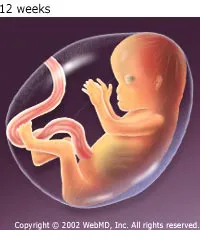9 Weeks Pregnant
Baby: Your baby is about the size of a peanut. The head is more erect, and the neck is more developed. During an ultrasound, you might see how your baby moves, even though you can't feel it yet.
Mom-to-be: Your uterus is continuing to grow, and you may notice your waistline thickening. Unless you tell people your special news, however, your pregnancy still won't be noticeable to others. You shouldn't have gained much weight yet, especially if you're having food aversions, cravings, heartburn, indigestion, nausea, or bloating.
Tip of the Week: Eat plenty of foods that contain calcium, such as cheeses, sardines, and broccoli. Your baby needs it, and so do you.
10 Weeks Pregnant
Baby: Your baby is still small but looks and acts like a baby. Arms and legs are longer and can bend at the elbows and knees.
Mom-to-be: Once the size of your fist, your uterus is now the size of a grapefruit. You still probably don't show much, but you may feel more comfortable in looser clothes. You may continue to feel tired and moody, but take heart: These symptoms shouldn't last too much longer.
Tip of the Week: Start shopping for maternity bras. You'll need one pretty soon. You can go ahead and get nursing bras if you're planning to breastfeed.
11 Weeks Pregnant
Baby: It's another big growth week. When your doctor uses a Doppler stethoscope now, she can hear the rapid "swooshing" noises of the heartbeat. Your baby's genitals are developing, but the sex can't be determined yet by ultrasound.
Mom-to-be: Pregnancy hormones show their good and bad effects. You may notice that your hair, fingernails, and toenails are growing faster. But you may also notice oily skin and acne.
Tip of the Week: Schedule a dentist appointment. See your dentist at least once in these nine months. Brush and floss daily, and take your prenatal vitamin for calcium to keep your teeth strong. Your gums may bleed more because of pregnancy hormones and increased blood volume. If they do, use a soft toothbrush.
12 Weeks Pregnant
Baby: All parts of your baby are developing, from tooth buds to toenails. Your baby will keep developing and getting larger and stronger for the rest of your pregnancy. By the end of this week, the chance of miscarriage drops considerably.
Mom-to-be: You'll feel more energetic for the next few weeks. The typical weight gain by now is from 1.5 to 5 pounds. Fathers-to-be might also experience pregnancy symptoms, called couvade, or "hatching," during the third month and at delivery, including nausea, abdominal pain, appetite changes, and weight gain.
Tip of the Week: Try not to fret about stretch marks. Most women get them on the breasts, abdomen, hips, or buttocks sometime during pregnancy. They won't go away, but they usually fade after pregnancy. Despite claims from manufacturers, creams and oils don't minimize them. How much they show depends on your skin's natural elasticity.
What's Happening Inside You?
By the end of the third month, your baby is fully formed, with arms, hands, fingers, feet, and toes. Little hands can open and close. Fingernails and toenails are beginning to develop, and the external ears are formed. Teeth are starting to form. Your baby's reproductive organs also develop, but the baby's sex is difficult to distinguish on ultrasound. The circulatory and urinary systems are working, and the liver produces bile.








.jpg)

.jfif)




.jfif)

